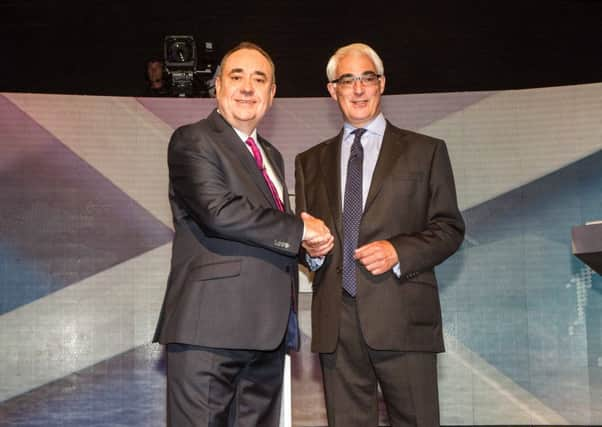Euan McColm: ‘Plan B’ question may haunt Salmond


When Mark Carney last week “intervened” in the referendum debate, Finance Secretary John Swinney welcomed his remarks as a sharp contrast to the scaremongering and threats of UK politicians. These were very welcome comments from the governor and, not only that, the Scottish Government was quite clear that after independence Scotland would use the pound and would do so in a currency union.
Alex Salmond was equally ebullient, telling MSPs during First Minister’s Question Time on Thursday that he too welcomed Carney’s remarks.
Advertisement
Hide AdAdvertisement
Hide AdWe might believe then that what the governor said was the game-changer that the Yes Scotland campaign so desperately needs as poll after poll continues to show a majority of Scots stubbornly refusing to give the SNP their blessing.
Of course, it was not.
Carney’s comments contained absolutely no succour for the nationalist cause and any suggestion to the contrary is – at the very best, and I am being kind because I do not like to accuse anyone of lying – completely disingenuous.
What the governor did was little more than to explain that he was carrying out the normal responsibilities of his job. Asked whether the Bank of England had contingency plans in place for the possible consequences of an independence vote, Carney said, why yes, yes we do. There was no detail of what these contingency plans might be, nor should Carney have felt compelled to make those public. Ensuring that the bank has contingency plans is no more than we should expect from the governor.
Carney confirmed the existence of these plans when asked at a press conference about the prospect of “deposit flight” from Scotland in the event of independence. Uncertainty about currency arrangements, said the governor, could raise financial stability issues. Therefore, he added, as we would expect, the bank was prepared for a range of consequences of the referendum.
Carney went on to say that the bank was alive to issues in financial markets and issues that could be related to Scotland before reiterating the bank’s responsibility for financial stability. There was not one word that suggested a view on the SNP’s proposal for a post-Yes currency union. But SNP doublethink created a different story.
Swinney hailed Carney’s remarks for being in sharp contrast to the “scaremongering and threats” of UK politicians, whose point blank refusal to countenance the idea of a currency union has become the single greatest problem facing the Yes Scotland campaign. Never mind that this was a thundering great category error. Carney is not a politician and expresses – quite rightly – no opinions on matters of political policy.
Regardless, Swinney made the comparison, the message being that the Governor of the Bank of England is a reasonable man and we are reasonable people so he is on our side.
Emboldened, the Finance Secretary added that the Scottish Government had had technical discussions with the bank regarding its proposal for a currency union and welcomed the governor’s acknowledgement that whatever decisions were made by politicians would be facilitated.
Advertisement
Hide AdAdvertisement
Hide AdSalmond said the governor’s remarks highlighted the recklessness of the Better Together campaign. Carney had to reassure the markets that all would be well because the damned unionists wouldn’t agree with his proposal. If only they would do as he said, everything would be fine. Uncertainty was entirely the fault of unionist unreasonableness on the matter of sterling.
Others might argue that, in fact, market uncertainty and the fear of depositors withdrawing their funds from Scotland, is down to the SNP’s failure to present a credible alternative to a formal currency sharing agreement in the event of a Yes vote.
While Salmond continues to insist that Westminster politicians are bluffing over their rejection of a shared pound, opponents will continue to say this reality exists in Salmond’s mind and nowhere else.
When the Bank of England took the unprecedented step of issuing a statement denying that it had entered into discussions with representatives of the Scottish Government about proposals for future monetary arrangements, the response came in perfect Newspeak.
There had been technical discussions, not negotiations, and the Scottish Government had always made this clear. Not so clear, though, that the Bank of England didn’t feel the need to clarify the impression being given by the SNP.
The Yes campaign – and the SNP in particular – is now desperate to present this issue as a simple case of Westminster politicians bullying Scots. The version now goes that Westminster has declared Scotland may not use the pound. This has not happened. Scotland may of course use the pound. It’s a tradable currency. But using it in that way, without a central bank, would carry risks. Were Salmond to suggest that as a possibility now, the markets soothed by Carney this week, would soon grow skittish, again.
The First Minister is failing to control the present, on currency, and that is not good news for his prospects of controlling the future.
In just two weeks, more than 700,000 postal ballots will be sent out. The Yes campaign doesn’t have the luxury of time: in the real world, clocks don’t strike 13.
Advertisement
Hide AdAdvertisement
Hide AdIt seems Salmond is to tough it out, holding a line that is quite clearly damaging the pro-independence campaign. Confession that he is wrong would be a betrayal of his party.
Unless the First Minister can find a clear line out of his currency issue, the next televised debate may feel to him like he’s been locked in Room 101 with thousands of tiny Alistair Darlings shrieking “what’s your Plan B?” at him.
What that line is, is difficult to see. Even if the First Minister is at his nation-building best, the currency question is becoming a boot stamping on his face.
Alex Salmond’s struggle is far from finished. He has not won a victory over currency.
He’s in big bother. «
Twitter: @euanmccolm